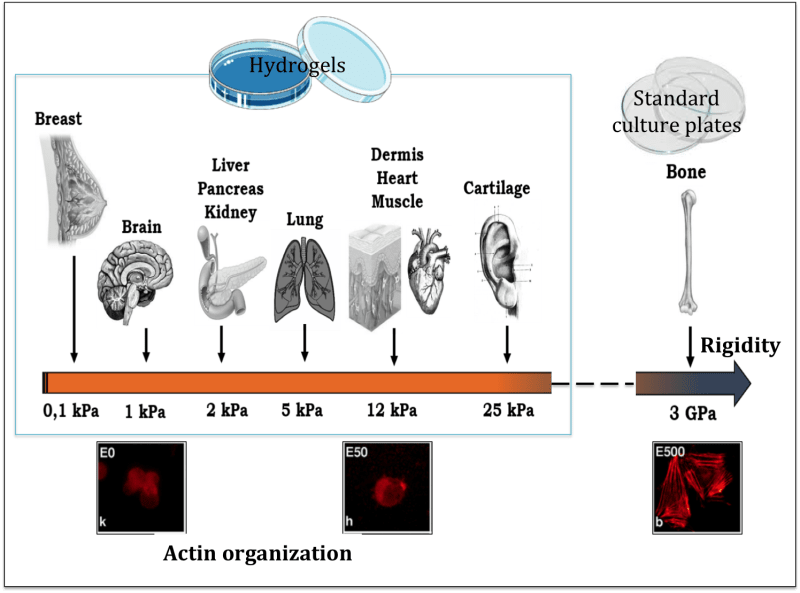Soft hydrogels for cell culture
A new generation of culture plates for in vitro 2D cell-based assays, that provides a biomechanical physiological micro-environment.




Benefits
- Brings in vitro, 2d cell culture closer to physiology
- Induces the emergence of physiologically relevant cell responses
- Ready to use
- For use under the same conditions as standard plastic or glass culture plates
- Available in standard formats (from bp35mm to 96 wells microplates)
- Compatible with standard analysis and analyzer tools
- Competitive cost: similar price to pre-coated plastic dishes
Issue
2D in vitro cell culture and cell-based assays are key tools for both academic and industry-based research in a wide variety of applications, mostly because they are easy to implement, reproducible, and do not raise any ethical concerns. But these assays are deeply lacking in in vivo physiological and mechanical relevancies as they are performed on plastic or glass dishes that have mechanical rigidity a million times greater than the in vivo cell environment. Furthermore, cells are organized in soft organs in vivo.
Most importantly, it has now been proven that the mechanical properties of the microenvironment impact almost every aspect of cell behavior. The failure of standard culture dishes to maintain the phenotype of many primary cells, or by appearing as incorrect predictors to translate promising in vitro results into in vivo clinical and industrial models and clinical success*, support the evidence that these conventional tools have reached their limits. And while several technologies try to address these limitations (such as 3D cell culture or microfluidics devices), they are still expensive or require new observation techniques and analysis methodologies that are difficult to adapt to existing industrial processes. None of these are able to offer versatile culture environments that are as well controlled as plastic or glass culture plates.
*In 2010, only 6% of in vitro drug candidates obtained new drug application (NDA) approval. 89% of these in vitro candidates failed during first-in-man trials.
Most importantly, it has now been proven that the mechanical properties of the microenvironment impact almost every aspect of cell behavior. The failure of standard culture dishes to maintain the phenotype of many primary cells, or by appearing as incorrect predictors to translate promising in vitro results into in vivo clinical and industrial models and clinical success*, support the evidence that these conventional tools have reached their limits. And while several technologies try to address these limitations (such as 3D cell culture or microfluidics devices), they are still expensive or require new observation techniques and analysis methodologies that are difficult to adapt to existing industrial processes. None of these are able to offer versatile culture environments that are as well controlled as plastic or glass culture plates.
*In 2010, only 6% of in vitro drug candidates obtained new drug application (NDA) approval. 89% of these in vitro candidates failed during first-in-man trials.
Solution
We offer 2D soft matrices that are fully compatible with existing industrial processes and meet industry quality requirements for cell culture. Our soft culture plates display mechanical features close to those found in vivo in animal or human tissues. They are flat hydrogels that exhibit either uniform (with physiological rigidities of 0.5 to 100kPa) or patterned mechanical properties (with, for the first time, gradients of rigidity from Pa/mm to kPa/μm) as seen in vivo. Additionally, the plates are pre-coated with adhesion proteins and guarantee the reproducibility of the chemical environment. Overall, our soft culture plates provide a ready-to-use, 2D model of the biomechanical cell environment for cell-based assays.
Our soft plates are compatible with robots, standard downstream cell analysis, and standard imaging techniques including inverted microscopy.
Customers can test non-uniform mechanical properties based on customizable standard patterns (steps of rigidities, stripes that mimic fibers, geometrical shapes) and can choose the chemical coating from 4 proteins of the extracellular matrix (fibronectin, vitronectin, laminine, collagen I) and the amino acids chains poly-lysine or poly-ornithine.
With the use of patented and innovative technologies, these new culture plates aim to induce the emergence of physiologically relevant cell phenotypes and responses, and are thus targeted at cancer research, stem cell differentiation, drug discovery, the cells and proteins markets, cosmetics, and other applications.
Our soft plates are compatible with robots, standard downstream cell analysis, and standard imaging techniques including inverted microscopy.
Customers can test non-uniform mechanical properties based on customizable standard patterns (steps of rigidities, stripes that mimic fibers, geometrical shapes) and can choose the chemical coating from 4 proteins of the extracellular matrix (fibronectin, vitronectin, laminine, collagen I) and the amino acids chains poly-lysine or poly-ornithine.
With the use of patented and innovative technologies, these new culture plates aim to induce the emergence of physiologically relevant cell phenotypes and responses, and are thus targeted at cancer research, stem cell differentiation, drug discovery, the cells and proteins markets, cosmetics, and other applications.